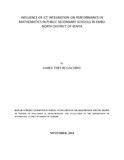| dc.description.abstract | Performance in mathematics examinations in Kenya and world over has generally been poor and
it has been attributed either to how the subject is taught and/or the negative attitude towards the
subject. Although much research has been done on factors affecting Information and
Communication Technology (ICT) integration and implementation, little has been done on how
it affects performance. This study therefore sought to investigate whether ICT integration
influences performance in mathematics specifically studying its influence on pedagogy. The
study hypothesized that when ICT components with specific reference to computers and their
integration in teaching and learning are used in presenting abstract concepts in mathematics such
as 3D geometry, it could help overcome such limitations on both the learner and the teacher and
therefore impact on the performance in test scores.
The study used an experimental research design to evaluate the extent to which ICT integration
influences performance in mathematics. A total of two hundred and eighteen (218) students from
ten different schools who were all in form four were selected with one group of one hundred and
four (104) students from five different schools being taught a concept in mathematics using the
traditional method of teaching i.e. face to face with a teacher and the other group of one hundred
and fourteen (114) students taught the same concept using ICT components. After a period of
two weeks the two groups sat for a standardized assessment test whose results were exposed to
an analysis using a paired t-test to determine whether there was a significant difference between
the average values of the same measurement made under two different conditions of teacher-led
pedagogy and ICT integrated classroom. Both measurements were made on each unit in a sample
and the test was based on the paired differences between the two variables using the SPSS
software.
Key findings from the analysis indicated that in schools where ICT was integrated in the
pedagogy of mathematics which was learner-centered, the learners performed much better than
similar groups taught using the teacher-led method which was teacher-centered in the
achievement test.
The study recommends that further research need to be done so as to evaluate the impact of
integration of ICT fully in teaching of all topics in mathematics on the performance.
With the key findings in the research, it is the recommendation of this work that the teaching of
such abstract concepts like 3D geometry which are perceived challenging in terms of its
presentation to learners by the teacher and its conceptualization on the part of the learner in the
traditional classroom method, should adopt the ICT integration to enhance academic
performance in mathematics | en_US |

